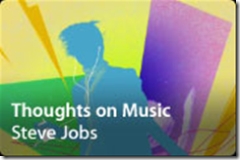Apple’s CEO is using the front page of apple.com to let us know where Apple stands on DRM.
 With the stunning global success of Apple’s iPod music player and iTunes online music store, some have called for Apple to “open” the digital rights management (DRM) system that Apple uses to protect its music against theft, so that music purchased from iTunes can be played on digital devices purchased from other companies, and protected music purchased from other online music stores can play on iPods. Let’s examine the current situation and how we got here, then look at three possible alternatives for the future.
With the stunning global success of Apple’s iPod music player and iTunes online music store, some have called for Apple to “open” the digital rights management (DRM) system that Apple uses to protect its music against theft, so that music purchased from iTunes can be played on digital devices purchased from other companies, and protected music purchased from other online music stores can play on iPods. Let’s examine the current situation and how we got here, then look at three possible alternatives for the future.
The first alternative? Everything stays the way it is: Apple sells FairPlay-restricted music, Microsoft sells Zune-ified and Windows Media-restricted music, Sony does whatever they do. Jobs doesn’t seem to have a problem with this scenario, which comes as no surprise since Apple’s vertically-integrated option is clearly winning the day. For that matter, it appears that customers, by and large, don’t have a real problem with it, since they’re not required to obtain their music only from the iTunes Store. As Jobs points out, the iPod and iTunes can easily play unrestricted music, and their research indicates that 97% of the music on the average iPod comes from some source other than the iTunes Store, so “iPod users are clearly not locked into the iTunes store to acquire their music.”
Alternative future #2 has Apple licensing FairPlay to other companies. According to Jobs, Apple has two major reasons not to license FairPlay. First is that licensing their DRM scheme would mean disclosing its inner workings to a large number of people. Inevitably, those secrets would be compromised. Second, repairing those compromises would mean getting all the licensees to play along—they’d have to update their devices, their client software, their stores as well. That sounds messy, and Jobs doesn’t like messy.
So what’s behind door #3? This is where Jobs throws down to the Big 4 record labels and those pesky Norwegians:
Imagine a world where every online store sells DRM-free music encoded in open licensable formats. In such a world, any player can play music purchased from any store, and any store can sell music which is playable on all players. This is clearly the best alternative for consumers, and Apple would embrace it in a heartbeat. If the big four music companies would license Apple their music without the requirement that it be protected with a DRM, we would switch to selling only DRM-free music on our iTunes store. Every iPod ever made will play this DRM-free music.
Much of the concern over DRM systems has arisen in European countries. Perhaps those unhappy with the current situation should redirect their energies towards persuading the music companies to sell their music DRM-free. For Europeans, two and a half of the big four music companies are located right in their backyard. The largest, Universal, is 100% owned by Vivendi, a French company. EMI is a British company, and Sony BMG is 50% owned by Bertelsmann, a German company. Convincing them to license their music to Apple and others DRM-free will create a truly interoperable music marketplace. Apple will embrace this wholeheartedly.
A number of people, many of whom I respect greatly, aren’t big fans of option #1: DRM now, DRM tomorrow, DRM forever. The Big Four and, it would appear, several governments, seem to like option #2. That fanbase enough is alone to make me queasy. Even if you think Jobs’ reasoning as to why licensing FairPlay is a bad idea sounds a bit shaky, you’d have to agree that broader licensing of any specific DRM scheme doesn’t solve any of the problems inherent in DRM itself. Option #3, though, seems like a real winner.
What’s more heartening is Jobs’ reasoning as to why DSM-free would be good for everyone involved. First, it solves the customer’s need for future-proofing and interoperability. MP3s will play on any device. Second, removing the requirement to operate a DRM scheme means many more players can enter the digital music market. Rather than playing a losing game of cat-and-mouse with DRM crackers, companies could focus instead on creating new and interesting ways of getting music to fans. Third, the major labels already sell 90% of their music DRM free, on CDs. Logically speaking, a single unrestricted track on the market completely undoes all the investment in DRM, since that track can be replicated endlessly for free on the internet. If that’s already the case, why not just go the final yard and sell the remaining 10% without DRM? Finally, and this is a pretty remarkable statement for the CEO of a company with such a large investment in DRM, restrictions on digital content haven’t worked. File sharing still exists.
The CEO of the top seller of digital music is basically saying that DRM is a big, fat, waste of money and time, and that he’d be just as glad to wash his hands of the whole mess. It’s logically flawed, doesn’t work, is a pain for customers, and is probably hurting the music business in general.
Source: Apple – Thoughts on Music




